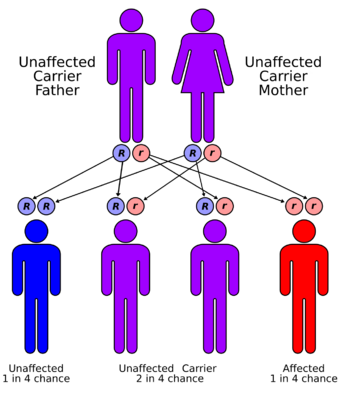Medicine:Berdon syndrome
| Berdon syndrome | |
|---|---|
| Other names | Megacystis-microcolon-intestinal hypoperistalsis syndrome, MMIH syndrome, MMIHS |
 | |
| Berdon syndrome has an autosomal recessive pattern of inheritance. | |
Berdon syndrome, also called Megacystis-microcolon-intestinal hypoperistalsis syndrome (MMIH syndrome),[1] is a generally fatal[2] autosomal recessive[3] genetic disorder affecting the bladder, colon, and intestines.
It is more prevalent in females (7 females to 3 males)[2] and is characterized by constipation and urinary retention, microcolon, giant bladder (megacystis), intestinal hypoperistalsis, hydronephrosis, and dilated small bowel. The pathological findings consist of an abundance of ganglion cells in both dilated and narrow areas of the intestine. It is a familial disturbance of unknown cause.
Walter Berdon et al. in 1976 first described[4] the condition in five female infants, two of whom were sisters. All had marked dilatation of the bladder and some had hydronephrosis and the external appearance of prune belly. The infants also had microcolon and dilated small intestines.
Genetics
Berdon syndrome is autosomal recessive, which means the defective gene is located on an autosome, and two copies of the gene – one inherited from each parent – are required to be born with the disorder. The parents of an individual with an autosomal recessive disorder both carry one copy of the defective gene but are usually not affected by the disorder.[citation needed]
Several genes are known to be implicated in this syndrome: these include ACTG2, LMOD1, MYH11 and MYLK.[5]
Diagnosis
Berdon syndrome is generally diagnosed after birth by the signs and symptoms as well as radiological and surgical findings. It can be diagnosed in the womb by ultrasound, revealing the enlarged bladder and hydronephrosis.[6]
Treatment
Long-term survival with Berdon syndrome usually requires parenteral nutrition and urinary catheterisation or diversion. Most long-term survivors also have ileostomies.[7] A multivisceral transplant (stomach, pancreas, small bowel, liver and large intestine) has also been successful.[8] In a 2011 study of 227 children with the syndrome, "the oldest survivor [was] 24 years old."[2]
References
- ↑ Online Mendelian Inheritance in Man (OMIM) 249210
- ↑ 2.0 2.1 2.2 Gosemann, Jan-Hendrik; Puri, Prem (2011). "Megacystis microcolon intestinal hypoperistalsis syndrome: Systematic review of outcome". Pediatric Surgery International 27 (10): 1041–6. doi:10.1007/s00383-011-2954-9. PMID 21792650.
- ↑ Annerén, Göran; Meurling, Staffan; Olsen, Leif (1991). "Megacystis-microcolon-intestinal hypoperistalsis syndrome (MMIHS), an autosomal recessive disorder: Clinical reports and review of the literature". American Journal of Medical Genetics 41 (2): 251–4. doi:10.1002/ajmg.1320410224. PMID 1785644.
- ↑ Berdon, WE; Baker, DH; Blanc, WA; Gay, B; Santulli, TV; Donovan, C (1976). "Megacystis-microcolon-intestinal hypoperistalsis syndrome: A new cause of intestinal obstruction in the newborn. Report of radiologic findings in five newborn girls". American Journal of Roentgenology 126 (5): 957–64. doi:10.2214/ajr.126.5.957. PMID 178239.
- ↑ Halim, Danny; Brosens, Erwin; Muller, Françoise; Wangler, Michael F; Beaudet, Arthur L; Lupski, James R; Akdemir, Zeynep H Coban; Doukas, Michael et al. (2017). "Loss-of-Function Variants in MYLK Cause Recessive Megacystis Microcolon Intestinal Hypoperistalsis Syndrome". The American Journal of Human Genetics 101 (1): 123–129. doi:10.1016/j.ajhg.2017.05.011. PMID 28602422.
- ↑ RESERVED, INSERM US14 -- ALL RIGHTS. "Orphanet: Megacystis microcolon intestinal hypoperistalsis hydronephrosis Berdon syndrome" (in en). http://www.orpha.net/consor/cgi-bin/Disease_Search.php?lng=EN&data_id=2113&Disease_Disease_Search_diseaseGroup=Berdon-syndrome&Disease_Disease_Search_diseaseType=Pat&Disease(s)%20concerned=Megacystis-microcolon---intestinal-hypoperistalsis---hydronephrosis--Berdon-syndrome-&title=Megacystis-microcolon---intestinal-hypoperistalsis---hydronephrosis--Berdon-syndrome-.
- ↑ "Megacystis microcolon intestinal hypoperistalsis syndrome | Genetic and Rare Diseases Information Center (GARD) – an NCATS Program" (in en). https://rarediseases.info.nih.gov/diseases/3442/megacystis-microcolon-intestinal-hypoperistalsis-syndrome.
- ↑ "This teen is living her best life after surviving a rare 18-hour transplant surgery" (in en). https://www.goodmorningamerica.com/living/story/teen-living-best-life-surviving-rare-18-hour-65107077.
External links
- Megacystis microcolon intestinal hypoperistalsis syndrome at NIH's Office of Rare Diseases
- Online Mendelian Inheritance in Man (OMIM) Megacystis microcolon intestinal hypoperistalsis syndrome; MMIH syndrome; Berdon syndrome -249210
| Classification |
|---|
 |

